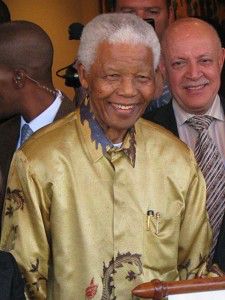
Boston University students met with Dean of Students Kenneth Elmore Friday to reflect on the importance of South African leader Nelson Mandela, who died Thursday.
“Honoring Nelson Mandela and what he’s about and what he did for his country is important,” said Mensimah Bentsi-Enchill, president of BU African Students Organization. “I’m glad I came today and that so many people came out.”
About 20 students gathered in the George Sherman Union’s East Balcony Friday afternoon for Coffee and Conversation, where Elmore moderated the group discussion. Students conversed about Mandela’s importance as a historical figure and what he ultimately stood for as a world leader.
Bentsi-Enchill said Mandela is important to remember for his strength and spirit of forgiveness, which was visible in his quest to reunite the blacks and whites of South Africa after the end of Apartheid and create a society of equality for all.
“That was really what his spirit was about — forgiveness, peace, but at the same time not being afraid, having courage to stand up for something. That’s something that everybody wants to try and emulate,” Bentsi-Enchill, a Sargent College of Health and Rehabilitation senior, said.
Elmore said he decided to hold a Coffee and Conversation session following Mandela’s death after a student tweeted at him with the idea.
“Coffee and Conversation is about trying to give people a chance to talk to each other,” he said. “A lot of times, when these sorts of circumstances happen, people just want to get together and talk. It’s that ability to connect with each other and find out how you, yourself, put meaning to a particular [event], in this case the death of Nelson Mandela.”
Mandela stands out as a historical figure because he saw his goal of equality realized and remained alive to see South Africa reunited after the Apartheid, Elmore said.
“He might be unique in that he is an individual who lived through a lot of what he set out in trying to do,” he said. “He remained steadfast in trying to make sure that South Africa would be and would remain a free place. We were able to see in his philosophy in many different ways.”
College of Arts and Sciences senior Joshua Cole said he enjoyed the exchange of ideas at this session of Coffee and Conversation.
“It was very engaging,” he said. “I learned a lot. I love listening to people talk and give their own views on a story or a single idea. Everyone has something unique to provide for the discussion, and I really enjoyed that.”
Like Bentsi-Enchill said, discussion participants recognized Mandela as an image of forgiveness, Cole said.
“After the discussion we had today, we came to the general consensus that he’s an important figure for the image that he gave us, which was forgiving, and not necessarily for being a peaceful man or a god-like figure,” he said. “It’s the humanity that he represented, and the forgiveness that we should practice in our lives.”
Julian Haller, a School of Education senior, said he enjoyed conversing with other students about the ideas Mandela represented in his actions to free South Africa from Apartheid. “His importance was huge, but something that I hadn’t even contemplated that came up today was whether we see him as a peacemaker or a racial revolutionary,” Haller said. “Figuring out how important he is [to society today] is going to be a question of what way we want to view him moving forward.”
CAS senior Matt Clarkin said he sees Mandela not as a peacemaker, but as an individual who fought for the freedom of South Africa.
“He proliferated peace by trying to hold a bigger stick, and, subsequently, by taking a sentence in jail,” he said. “So he’s a martyr, he’s a fighter, as opposed to someone who just proliferated peace.”
Christian Cho, assistant director of the Howard Thurman Center, said he was pleased with the discussion at Coffee and Conversation, but hopes that students elsewhere are having similar conversations.
“I’m not sure if people are having these kinds of conversations on their own,” he said. “While it’s nice, my hope is that people feel comfortable and compelled to have this level of depth to their conversations no matter what they are about or how structured they might be.”

















































































































